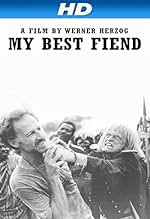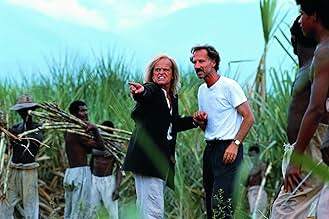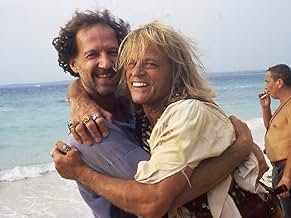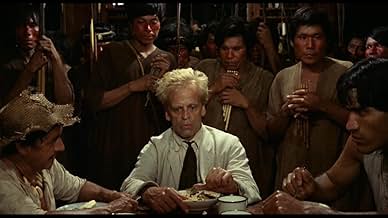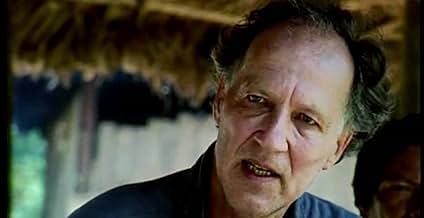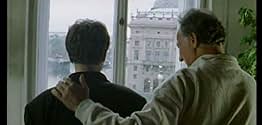Kinski, il mio nemico più caro
Titolo originale: Mein liebster Feind - Klaus Kinski
VALUTAZIONE IMDb
7,8/10
12.755
LA TUA VALUTAZIONE
Anni dopo, avrebbero condiviso un appartamento dove, in un impeto di rabbia di quarantotto ore, lui distrusse completamente il bagno. Da questo caos è nata una partnership violenta, amore-od... Leggi tuttoAnni dopo, avrebbero condiviso un appartamento dove, in un impeto di rabbia di quarantotto ore, lui distrusse completamente il bagno. Da questo caos è nata una partnership violenta, amore-odio, profondamente creativa.Anni dopo, avrebbero condiviso un appartamento dove, in un impeto di rabbia di quarantotto ore, lui distrusse completamente il bagno. Da questo caos è nata una partnership violenta, amore-odio, profondamente creativa.
- Regia
- Sceneggiatura
- Star
- Premi
- 1 vittoria e 2 candidature totali
Klaus Kinski
- Self
- (filmato d'archivio)
Guillermo Ríos
- Self
- (filmato d'archivio)
Andrés Vicente
- Self
- (filmato d'archivio)
Paul Hittscher
- Self
- (filmato d'archivio)
Mick Jagger
- Self - Wilbur
- (filmato d'archivio)
Thomas Mauch
- Self
- (filmato d'archivio)
Jason Robards
- Fitzcarraldo
- (filmato d'archivio)
Walter Saxer
- Self
- (filmato d'archivio)
Recensioni in evidenza
This fascinating documentary is not really about a madman. It's about two madmen. While it's quite obvious from the outset that Klaus Kinski is a nutcase, it becomes more and more apparent that Werner Herzog himself is a pretty crazed character as well. For anyone who has seen Aguirre, the Wrath of God or Fitzcarraldo this will come as no surprise, seeing as those two movies were pretty crazy undertakings to begin with. Travelling down the Amazon on primitive rafts and dragging steamboats over hills are not the sort of activities carried out by normal film makers. Repeatedly making films with Kinski was perhaps an even less sane idea but Herzog made five features with this most demented actor. The films themselves are completely engrossing and unique. This documentary is likewise.
Having read Kinski's autobiography 'Kinski Uncut' I was under no illusions of what I was going to encounter here. The book is a quite extraordinary account. Surely there has never been a star autobiography quite like this one? Full of aggression, madness and pornographic detail of his sexual exploits, this was the work of a deranged individual. Kinski didn't really focus on his film career, he concentrated much more on his sexual liaisons and was not shy at hurling insults around at famous people. For instance, he declined a role offered to him from Federico Fellini because the money was not good enough, he dismissed Fellini with the words 'Go and have yourself f---ed in the ass!'. I couldn't imagine Tom Hanks saying this to Steven Spielberg to be perfectly honest. In the book too, Kinski continually makes clear his severe dislike for Herzog. In My Best Fiend, Herzog suggests that both men worked on the insults together in order to make the book more sensational. I do have to wonder to the legitimacy of this claim, as it does seem strange. From what I have seen Kinski needed no assistance in coming up with insults to hurl at anyone, least of all Werner Herzog.
So, similar to Kinski's book, the account given by Herzog in this documentary is a highly subjective one. You really can never be sure the true extent of the truth, and you never will be. But My Best Fiend is a terrific film whatever the case. Herzog is incapable of being boring and he does capture the essence of the relationship between these two striking individuals very well. There are a number of other people interviewed too, who worked with these men on these films and this adds a great deal to the story. While there is some fantastic footage of Kinski to appreciate, from the pure unhinged insanity of his Jesus Christ Savior performance, to his intense ranting over a minor food-based complaint on the set of Fitzcarraldo, to the extraordinary gentleness of his interaction with a butterfly.
This film is a rarity in that it is one that can just as easily be enjoyed even if you have no knowledge of the films made by the two principal characters. Both men are just too unorthodox and the relationship so fraught that the story of their relationship is enough in itself. For fans of the movies themselves, this is of course, an absolute must.
Having read Kinski's autobiography 'Kinski Uncut' I was under no illusions of what I was going to encounter here. The book is a quite extraordinary account. Surely there has never been a star autobiography quite like this one? Full of aggression, madness and pornographic detail of his sexual exploits, this was the work of a deranged individual. Kinski didn't really focus on his film career, he concentrated much more on his sexual liaisons and was not shy at hurling insults around at famous people. For instance, he declined a role offered to him from Federico Fellini because the money was not good enough, he dismissed Fellini with the words 'Go and have yourself f---ed in the ass!'. I couldn't imagine Tom Hanks saying this to Steven Spielberg to be perfectly honest. In the book too, Kinski continually makes clear his severe dislike for Herzog. In My Best Fiend, Herzog suggests that both men worked on the insults together in order to make the book more sensational. I do have to wonder to the legitimacy of this claim, as it does seem strange. From what I have seen Kinski needed no assistance in coming up with insults to hurl at anyone, least of all Werner Herzog.
So, similar to Kinski's book, the account given by Herzog in this documentary is a highly subjective one. You really can never be sure the true extent of the truth, and you never will be. But My Best Fiend is a terrific film whatever the case. Herzog is incapable of being boring and he does capture the essence of the relationship between these two striking individuals very well. There are a number of other people interviewed too, who worked with these men on these films and this adds a great deal to the story. While there is some fantastic footage of Kinski to appreciate, from the pure unhinged insanity of his Jesus Christ Savior performance, to his intense ranting over a minor food-based complaint on the set of Fitzcarraldo, to the extraordinary gentleness of his interaction with a butterfly.
This film is a rarity in that it is one that can just as easily be enjoyed even if you have no knowledge of the films made by the two principal characters. Both men are just too unorthodox and the relationship so fraught that the story of their relationship is enough in itself. For fans of the movies themselves, this is of course, an absolute must.
Fascinating portrait about a fascinating personality - filmed by one of the best and most important German directors. Werner Herzog and his star Klaus Kinski, who have been friends and foes all in one, were responsible for some of the greatest German movies ever made like "Aguirre", "Nosferatu" or "Cobra Verde", which got their brilliance in the first place from their inimitable main actor. In this documentary you see some scenes from their common films, but the best moments are the rare footages, like Kinski´s notorious cholerical outbursts of rage for example. Werner Herzog was one of the persons who knew this genius and madman best - an extreme relationship between love and hate, what´s also reflected on the whole film: a love letter as well as a requital!
I can't help but like Klaus Kinski. Sure that's easy for me to say, having only encountered him on film, but despite (or probably because of) the madness, the anger and the raving, there's something magnetic about the man. He's like no other actor out there. No one else was so crazy, so passionate and so captivating. He was certainly one of a kind.
However, despite my regard for him as an actor, I can't say that I envy those who had to work with him. Raving fits, shootings and murder plots aren't par for the course when it comes to the majority of movie shoots. Hell, they're not normal by any standards. But then again, Klaus Kinski and Werner Herzog are far from ordinary people. Both had their madness one explicit and one masked and both went to extraordinary lengths to get what they wanted.
I think the piece in the film that best illustrated their shared madness was the story behind Kinski's 'autobiography'. Now to have biography that is largely fictional is nothing new, as people always rewrite their lives, but to have the person that you're insulting have you help insult them is rather extraordinary. It suggests a sadomasochism and a perversity in their relationship. But it also suggests a twisted affection. They hated each other and yet loved each other. No matter how hard they tried they couldn't stop gravitating towards one another.
And it seems that this strange attraction was there from the beginning. After the amazing 'Jesus' footage, the film opens with Herzog reliving his early childhood experiences with Kinski. Just listening to the stuff is amazing. Apparently, before he moved into the halfway house that Herzog used to live in, Kinski used to live naked in an apartment that was filled with leaves. But then once he did move, he proceeded to ruin bathrooms, knock doors down, assault theatre critics ("I was not excellent! I was not extraordinary! I was monumental! I was epochal!"), and my favourite thing of all, rave at the woman who gave him free board, free food, and who did his laundry, for not ironing his shirts neatly enough. The man was a maniac. Yet I can imagine the young Herzog watching these displays in awe. If only someone could harness this energy.
Well, as Herzog's films prove, he certainly harnessed it. But as you'd expect, it was never smooth sailing. Kinski continually caused havoc on set and the bizarre incidents piled up higher and higher. But although listening to Herzog recount these incidents is fascinating enough, the footage itself is amazing. We only get to see snippets of the 'Fitzcarraldo' documentary, but the 'mild' raving fit that is shown illustrates what Herzog was dealing with every day. Sheer madness! In the footage that is shown it's an argument over food, but it really could be anything. Indeed, Herzog often says that Kinski would erupt for the smallest of reasons. But to see Kinski in action is amazing. He's like an animal.
Yet despite the madness, the film also manages to convey Kinski's warmth. There's some wonderful footage at a film festival in America where Herzog and Kinski embrace and joke with one another. In light of what comes before it's really surprising, as it seems impossible to imagine such moments between the two. But when you see it you can't help but come to the conclusion that the two men really did have a deep affection for one another. As well as the hate, there was a lot of love between the two. I also loved the Pongo footage from the 'Fitzcarraldo' documentary. Again you get to see the kindness that Kinski possessed, as he bandages the camerman's hand.
But although the film reveals a lot about Kinski, Herzog still remains something of an enigma. It's clear that he loved and hated Kinski there's one scene where Herzog is talking to a photographer and he suddenly looks overwhelmingly sad, almost like a widower but we're never really allowed to get into his head. In fact, there's one bit where he says that Kinski thought that he was mad but he assures us that he's 'clinically sane'. But as he stands there, holding onto a tree, he does look quite mad. And for all we know he may well be, or may well have had his madness, as what sane person could tolerate Kinski's pestilence?
But mad or not, it doesn't matter. The films that Herzog and Kinski made together are amongst the best in the world, and Herzog's documentary is a captivating, amusing, disturbing, and ultimately, moving tribute to his colleague and friend. The final minutes, in particular, I loved.
However, despite my regard for him as an actor, I can't say that I envy those who had to work with him. Raving fits, shootings and murder plots aren't par for the course when it comes to the majority of movie shoots. Hell, they're not normal by any standards. But then again, Klaus Kinski and Werner Herzog are far from ordinary people. Both had their madness one explicit and one masked and both went to extraordinary lengths to get what they wanted.
I think the piece in the film that best illustrated their shared madness was the story behind Kinski's 'autobiography'. Now to have biography that is largely fictional is nothing new, as people always rewrite their lives, but to have the person that you're insulting have you help insult them is rather extraordinary. It suggests a sadomasochism and a perversity in their relationship. But it also suggests a twisted affection. They hated each other and yet loved each other. No matter how hard they tried they couldn't stop gravitating towards one another.
And it seems that this strange attraction was there from the beginning. After the amazing 'Jesus' footage, the film opens with Herzog reliving his early childhood experiences with Kinski. Just listening to the stuff is amazing. Apparently, before he moved into the halfway house that Herzog used to live in, Kinski used to live naked in an apartment that was filled with leaves. But then once he did move, he proceeded to ruin bathrooms, knock doors down, assault theatre critics ("I was not excellent! I was not extraordinary! I was monumental! I was epochal!"), and my favourite thing of all, rave at the woman who gave him free board, free food, and who did his laundry, for not ironing his shirts neatly enough. The man was a maniac. Yet I can imagine the young Herzog watching these displays in awe. If only someone could harness this energy.
Well, as Herzog's films prove, he certainly harnessed it. But as you'd expect, it was never smooth sailing. Kinski continually caused havoc on set and the bizarre incidents piled up higher and higher. But although listening to Herzog recount these incidents is fascinating enough, the footage itself is amazing. We only get to see snippets of the 'Fitzcarraldo' documentary, but the 'mild' raving fit that is shown illustrates what Herzog was dealing with every day. Sheer madness! In the footage that is shown it's an argument over food, but it really could be anything. Indeed, Herzog often says that Kinski would erupt for the smallest of reasons. But to see Kinski in action is amazing. He's like an animal.
Yet despite the madness, the film also manages to convey Kinski's warmth. There's some wonderful footage at a film festival in America where Herzog and Kinski embrace and joke with one another. In light of what comes before it's really surprising, as it seems impossible to imagine such moments between the two. But when you see it you can't help but come to the conclusion that the two men really did have a deep affection for one another. As well as the hate, there was a lot of love between the two. I also loved the Pongo footage from the 'Fitzcarraldo' documentary. Again you get to see the kindness that Kinski possessed, as he bandages the camerman's hand.
But although the film reveals a lot about Kinski, Herzog still remains something of an enigma. It's clear that he loved and hated Kinski there's one scene where Herzog is talking to a photographer and he suddenly looks overwhelmingly sad, almost like a widower but we're never really allowed to get into his head. In fact, there's one bit where he says that Kinski thought that he was mad but he assures us that he's 'clinically sane'. But as he stands there, holding onto a tree, he does look quite mad. And for all we know he may well be, or may well have had his madness, as what sane person could tolerate Kinski's pestilence?
But mad or not, it doesn't matter. The films that Herzog and Kinski made together are amongst the best in the world, and Herzog's documentary is a captivating, amusing, disturbing, and ultimately, moving tribute to his colleague and friend. The final minutes, in particular, I loved.
10sound-4
I first caught this film midway through, when it was on IFC. Not only did it stop me in my tracks, but I looked up to see when it would next be on so I could set the VCR. Though Herzog attempts to portray himself as the cool and reasonable half of this dastardly duo, his own megalomania and ego shine through. This documentary catches on film the fine edge between brilliance and insanity, and the result is simply stunning. This is not a biography of Kinski but rather a kind of valentine to him that celebrates his (and Herzog's) mad genius.
I like this documentary and recommend owning it. There are so many scenes that one can jump to to find Kinski's leering face and saying something fantastic. I believe that he somehow opened up his third eye and could no longer see most of the world that we live in. ----Or am I being fooled--- either way, Kinski has left his mark or should I say scar across the face of theatre and film. My only wish is that someone somewhere compiles a volume set of his greatest scenes ranging from a star performance in a well considered artful Herzog film to all of his 'B' movie bombs.
I still enjoy hearing Herzog imitating Kinski and saying, "I was Monumental I was Epical!!!!" ---and his description in the beginning of the doc. when he throws a tantrum that lasts for several days, destroying everything in the bathroom to the point where you could pass every bit through a tennis racket.
That is power. Watch it and believe.
I still enjoy hearing Herzog imitating Kinski and saying, "I was Monumental I was Epical!!!!" ---and his description in the beginning of the doc. when he throws a tantrum that lasts for several days, destroying everything in the bathroom to the point where you could pass every bit through a tennis racket.
That is power. Watch it and believe.
Lo sapevi?
- QuizIn some footage of one of his notorious on-set flare-ups, Klaus Kinski yells at Werner Herzog that he's "a dwarf director!" This apparently random insult is a specific reference to Herzog's movie Anche i nani hanno cominciato da piccoli (1970).
- Citazioni
Werner Herzog: Every grey hair on my head, I call Kinski.
I più visti
Accedi per valutare e creare un elenco di titoli salvati per ottenere consigli personalizzati
- How long is My Best Fiend?Powered by Alexa
Dettagli
Botteghino
- Lordo Stati Uniti e Canada
- 95.612 USD
- Fine settimana di apertura Stati Uniti e Canada
- 7677 USD
- 7 nov 1999
Contribuisci a questa pagina
Suggerisci una modifica o aggiungi i contenuti mancanti


